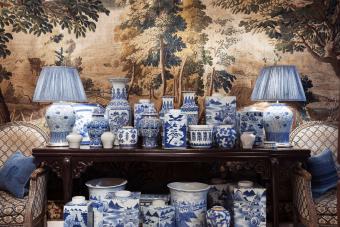
While China has increasingly adopted Western influences, the traditional family structure is still highly valued and holds a prominent position in Chinese culture. Both traditional and modern Chinese families have similar values and morals, and these have been a part of daily life for many centuries.
Gender Roles
Traditional Chinese family values clearly distinguish different roles and rights for men and women. While these are rapidly changing, the original values are still evident on some levels.
Role of Men
In the traditional Chinese family, the man is responsible for maintaining, providing for, and protecting his family. He is also given all the decision-making power when it comes to his wife and other family members. He is responsible for supporting his children's education until they are married. In modern families, the family members consult elders about important decisions, but the father no longer has the final say with regard to his adult children's lives.
Role of Women
Women have traditionally served in a subordinate position within Chinese culture. Traditional Chinese mothers usually stayed in the home to take care of the children, the home, and the rest of the family. However, the role that women play within society is ever expanding. According to the 2020 United Nations Development Programme's Human Development Report, 69 percent of women participated in the labor force in China. Due to increased opportunities, women are seeking careers in addition to their traditional child-rearing role. However, there is a gender wage gap in China, and fewer females than males in higher paying, higher power positions.
Patrilineal Descent
Traditional Chinese families honor the patrilineal descent system. This means that a child's lineage is calculated from his father only. In this type of system, men are the only ones who can inherit family membership and family land or other inheritance.
Importance of Family
That statement 'family is life' holds true in Chinese culture. Family is very important. So important, in fact, that the family is the base of Chinese culture. Several Confucian thoughts are based on family. For example, three of the five important relationships are parent and child, husband and wife, and elder and younger siblings. There are specific responsibilities and duties delineated to parents, children, and grandparents in China's 1981 marriage law. However, this law has been updated over the years to reflect societal changes, such as legalizing interracial marriage. As such, the role that family is playing in Chinese culture is an evolving one, with some young adults breaking off from traditions and starting their own.
Views on Children
In order to combat overcrowding and overpopulation, the People's Republic of China mandated a one-child-per-household policy in the late 1970s. This law often only applied to urban families, while some rural families could get away with having more than one child. This policy influenced how children were viewed, and led to female infanticide because females wouldn't be able to carry on the family name or inherit the family land. However, due to a declining birthrate, this was changed to a two-child-per-household policy in 2016, followed by a three-child-per-household policy in 2021.
Obedience and the Family Unit
In traditional families, all children are expected to obey their parents without discussion, and parents could legally kill their children if they disobeyed them or refused to show unquestioning obedience. In modern China, both girls and boys are usually treated equally. However, many Chinese parents are strict, since the choices of the children reflect on the parents. This comes back to the family being seen as a unit rather than individual people.

Marriage
Marriage, family, and children are also very important in Chinese culture. Because such a large portion of the population lived in rural environments for so long, getting married and having children meant that you'd have workers and be able to create and maintain a homestead. Traditional marriages were arranged by the parents of the bride and groom. Many couples never even met one another until their wedding day. Arranged marriages were prohibited in the 1950 marriage law. Modern Chinese couples choose their own partners, but many still ask for their elders' approval.
Respect for Elders
As in many Asian cultures, the elders of the family are revered for their wisdom. This is founded in Confucianism through the concept of filial piety, devotion, and respect for elders. In both traditional and modern families, elders are respected, taken care of, and revered by the rest of the family. In traditional families, including those living in a rural environment, many households include five generations living together. Even in modern households, many grandparents live with their children and their kids. They typically play a large role in the raising of their grandchildren. When Chinese elders pass away, they are traditionally honored by ancestor altars in homes that feature candles, photographs, and their favorite items. More recently, however, the rapidly aging population in China has led to fast-expanding institutional care.
Changing Values
The Chinese culture has undergone many dramatic changes in recent years, but the family structure and the importance of family values remain a focus. Families are still cherished, honored and respected, whether you live in the traditional, rural environment, or a modern, urban city.







